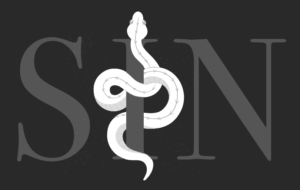Sin is a loaded word. For those outside the faith, it’s a funny and dated religious term. For Christians, we repeat it so often that it loses its bite. Scripture reveals that sin is worse than we know. Jesus is so serious about it that he says, “If your eye causes you to sin, gouge it out.” What is it about sin that’s so fatal it would require Jesus to go to the cross?
This Lent we do a soul examination, studying all the ways God describes the complex of sin. Lawlessness, adultery, rebellion . . . The cancerous nature of sin means that we need to go deeper than surface confession. The problem is worse than we know, which makes our Savior greater than we can imagine.

Invocation
Glory be to the Father, and to the Son, and to the Holy Spirit, who delivers us from all evil.
Invitation Prayer
Lord, evil often comes from those closest to us. Peter denied you and Judas betrayed you. You know the pain of evil that comes from your friends. Comfort us when we are hurt by those we love. Lord Jesus, without you we fall. With you, we stand. Stay with us, Amen.
Word
Matthew 25:36
“I needed clothes and you clothed me, I was sick and you looked after me, I was in prison and you came to visit me.”
Meditation: Outstretched Hands by Susan Becher Schultz
There is a type of therapy called ‘Internal Family Systems’ developed by Richard Schwartz in the 1980s. This theory postulates that the mind is made up of multiple parts, with a person’s ‘true self’ at the center. Just like parts of the physical body, or members of a church congregation, each has their own role, opinions, and viewpoints. Each part has a positive intention, even if it conflicts vastly with other parts. The goal of this therapy is to align all of the parts in order to gain trust and cooperation in oneself.
Trust. Trust is the word that I keep coming back to in therapy. This idea that I can trust myself, but also trust others to care for me. That I can trust my body to communicate with me, and trust my mind to interpret that communication. A congregation without trust is bound to fall apart or implode. A physical body that doesn’t trust itself will decline. Trust is the root of all things.
When a trauma occurs, trust is often broken. Trauma is an emotional reaction to an extremely distressing event. When it is retriggered it is usually not as a memory, but as a full, embodied response that does not match the current lived experience. Trust in self, trust in people, trust in systems, whatever the trauma revolves around, doesn’t come back overnight. It can take weeks, months, years, and sometimes, doesn’t ever heal.
In case of my medical trauma, I didn’t receive the healthcare I needed and was dismissed constantly as being young and healthy even while dealing with a failing organ. On another level, I was far from friends and family while my husband dealt with his own trauma at his place of employment.
I lost trust in doctors. I lost trust in the safety of a pre-covid world. I lost trust in community because I couldn’t physically reach mine. And finally, because the layers ran so deep, I lost trust in myself. I lost trust in the relationship I had with my body and mind. Ever since it happened two years ago, it’s cycled through me, this loss of safety on a number of levels. No matter how hard I try to heal on my own, I fall short.
Trauma is a form of sin. It is caused by something done to us, or something we have failed to do for others. Like this passage in Matthew, Jesus distinguishes between those who showed up to care for others, and those who chose to perpetuate systems of brokenness.
We are all so much more connected to one another than we know. When a tragedy happens, it rips through multiple layers of a community. The only way to heal from a trauma is to begin to welcome in experiences that counteract the original experience.
We have a choice, to heal or to remain hurt. If we chose to heal, we chose to begin to trust. In trusting, we acknowledge we can’t do it on our own. In community, we begin to take small steps forward. In Jesus, we begin to find forgiveness in where we have failed others, and where others have failed us.
The beautiful thing is, God designed healing from a traumatic experience to look something like this: You begin to reach out to others experiencing their own trauma, your hands stretched across the space where others have fallen short.
Dear Lord, thank you for giving us communities to heal in, and a relationship with you we can always trust in. Guide us this week as we choose how to show up for ourselves and for others. Amen.
Sending
Lord, in the face of evil, you call us from death to life, from silence to speech, from idleness to action. Go with us now. Send us with your gifts. Sustain us by your promise. Amen.
